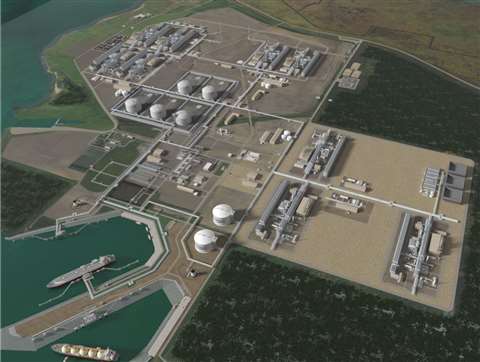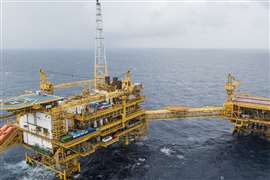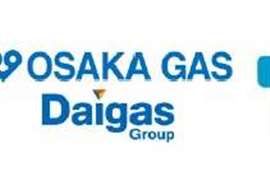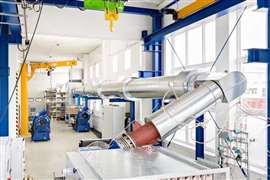Read this article in 中文 Français Deutsch Italiano Português Español
Cheniere seeks to expand Sabine Pass LNG facility
March 07, 2023
 The Sabine Pass LNG terminal has operational regasification facilities that include five LNG storage tanks, vaporizers, and three marine berths. (Image: Cheniere.)
The Sabine Pass LNG terminal has operational regasification facilities that include five LNG storage tanks, vaporizers, and three marine berths. (Image: Cheniere.)
Cheniere Energy Partners has plans to expand its Sabine Pass Liquefaction Project by about 20 million tonnes per annum (MTPA). The company began the “pre filing” process for the expanded capacity, which, if approved, would be adjacent to the existing Sabine Pass Liquefaction Project in Cameron Parish, Louisiana, USA.
The expansion project is designed to include up to three large-scale liquefaction trains, each with a production capacity of approximately 6.5 mtpa of LNG, a boil-off-gas (“BOG”) re-liquefaction unit with an approximate production capacity of 0.75 mtpa of LNG, and two 220,000m3 LNG storage tanks, Cheniere said.
The SPL Expansion Project is being designed with accommodations for waste heat recovery as well as carbon capture from acid gas removal units. The expansion project is expected to benefit from the significant existing infrastructure at the SPL Project and contemplates various enhancements to its current capabilities, including optimized ship loading at the existing marine facilities. Feed gas related to the SPL Expansion Project is expected to be transported via a combination of new and existing pipelines currently supplying the SPL Project, Cheniere said.
Cheniere Partners has hired Bechtel Energy, Inc. to complete a Front-End Engineering and Design (FEED) study of the SPL Expansion Project.
“As the first and largest LNG export facility in the Lower 48, Sabine Pass has pioneered an industry critical to supplying reliable, flexible, and cleaner burning natural gas to markets and customers around the world, and we look forward to significantly growing those capabilities through the SPL Expansion Project,” said Jack Fusco, chairman, president and CEO of Cheniere Partners.
Cheniere Partners owns the Sabine Pass LNG terminal located in Cameron Parish, Louisiana, which has natural gas liquefaction facilities consisting of six liquefaction Trains with a total production capacity of approximately 30 million tonnes per annum of liquefied natural gas. The Sabine Pass LNG terminal also has operational regasification facilities that include five LNG storage tanks, vaporizers, and three marine berths. Cheniere Partners also owns the Creole Trail Pipeline, which interconnects the Sabine Pass LNG terminal with a number of large interstate and intrastate pipelines.
Cheniere is already the largest US LNG exporter and if approved and constructed, the company would have a total production capacity of 78.3 MTPA, more capacity than any country with the exception of Qatar and Australia, according to an analysis from Poten & Partners.
Cheniere’s size and track record gives it some inherent advantages over its U.S. competitors, although all LNG producers will face tough competition starting in 2028, when the market is expected to be oversupplied, Poten said.
The Houston-based exporter currently has a total LNG production capacity of 45 MTPA between Sabine Pass and Corpus Christi. The company is in the middle of construction for its Corpus Christi Stage 3 project, which will add seven midscale trains with a combined 10 MTPA of capacity and a storage tank with 160,000 m³ of capacity. General contractor Bechtel is nearly 25% complete with the project and initial production is expected by the end of 2025, Poten said.
Cheniere is seeking permission to add two more midscale trains at Corpus Christi that will produce another 3.3 MMt/y of LNG, in addition to the 20 MMt/y at Sabine Pass.
The company expects to file its formal FERC application by the end of this year and begin construction by 4Q 2025. If all stays on schedule, initial production will begin in 2030 and the completed project will be in service by 2H 2032, Poten said.
In addition, Cheniere is adding seven midscale LNG trains as part of its Corpus Christi Stage 3 expansion project but began the FERC prefiling process in August 2022 to add two more in a project dubbed Midscale Trains 8 & 9, Poten said.
The two new trains will add 3.3 MMt/y of capacity at the plant. The company was to add a new storage tank and then walked back those plans, instead opting to route the proposed production to an already existing tank.
Corpus Christi LNG has two berths and neither the Stage 3 expansion nor the Midscale Trains 8 & 9 project require adding a new one. Instead, the company is seeking to optimize loading and increase the 12,000 m³/hour loading rates at its already-existing docks.
The Texas export terminal is currently authorized to handle 400 calls from LNG carriers but is seeking to increase that number to 480 calls per year. Cheniere expects to file its formal application for the Corpus Christi project by the end of 1Q 2023 and begin construction by October 2024. The project has an in-service date of 2H 2031.
To secure financing, the proposed expansion projects will require 15-20-year contracts that will push demand for LNG to 2050 and beyond. With 370 MMt/y of LNG regasification capacity under development, Cheniere says Vietnam, the Philippines and Ghana will be among the nine new countries to begin importing LNG by 2024, Poten said.
MAGAZINE
NEWSLETTER

CONNECT WITH THE TEAM








